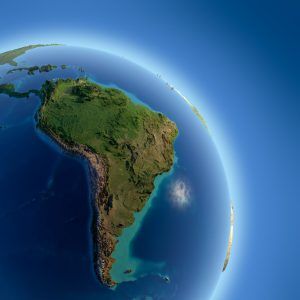
(As Marijuana Business Daily ramps up its coverage of the global cannabis market, it’s launching a series examining recent marijuana legalization and business developments worldwide. The first few installments will focus on Latin America, starting with Chile and Argentina.)
While Canada and the United States dominated marijuana headlines over the past year, their neighbors in Latin America also made some waves.
Though business and investment opportunities are not nearly as strong as they are in the United States and Canada, Latin American countries are making progress that paves the way for such opportunities down the road.
And some foreign companies – particularly those that can export cannabis and related products – have been able to capitalize.
Here’s a look at recent developments in two Latin American countries, Chile and Argentina.
CHILE
Snapshot
Chile has the highest cannabis consumption rates per capita in Latin America as well as the largest support for marijuana legalization.
Despite these indicators, political reforms are lagging behind societal changes. But the country is moving in the direction of reform.
Law 20,000 – which was enacted in 2005 and modified in 2015 – decriminalized growing marijuana at home for personal consumption for any use, medical or recreational.
Business and investment opportunities
Opportunities are extremely limited, though recent trends are promising for entrepreneurs.

Additionally, imports of medical cannabis products are allowed in some cases, both as registered and “nonregistered” medicines.
A special authorization allows the country’s health department to grant provisional authorizations for the distribution and sale of nonregistered pharmaceutical products in cases of scarcity or non-availability.
Latest developments
- In early 2017, Chilean firm Alef Biotechnology, partnering with Canadian licensed producer Tilray, received approval to import 600 bottles of 25-milliliter cannabis drops. Two varieties of these drops were imported: TC100 – which has 5 milligrams of THC and 5 milligrams of CBD per milliliter – and T100, which has 10 milligrams of THC and 0 milligrams of CBD per milliliter. The drops initially were sold under special prescription in select pharmacies in Santiago and then eventually became available across the country. They are considered non-registered pharmaceutical products.
- Sativex, produced by United Kingdom-based GW Pharmaceuticals, is currently the only registered cannabis-based medicine approved in Chile. It was OK’d in October 2016 to treat multiple sclerosis spasms but was still not available in pharmacies in mid-2017.
- At the end of 2016, Daya Foundation – Chile’s most prominent nongovernmental MMJ organization – became the first group to obtain permits from the Agricultural and Livestock Service of Chile to cultivate cannabis. Daya is working in partnership with Australian-based AusCann. The cannabis crop is expected to be used in clinical trials conducted by Knop Laboratorios. In advance of the trials, Daya tried to distribute 10,000 units of free cannabis products to 1,500 patients last year. However, Chile’s health agency denied the request since clinical trials were ongoing and Tilray’s products were already available.
ARGENTINA
Snapshot
In March 2017, Argentina’s Senate unanimously passed a medical marijuana bill, and officials then created a regulatory framework in September.
Once the new program is up and running, registered patients will have access to medical cannabis free of charge.
There’s currently no domestic supply and imports have not been authorized for the nascent MMJ program.
So patients must apply for a case-by-case authorization to import medical cannabis under the previous system.
Because of the high expense involved, most patients rely on the black market.
Business and investment opportunities
Details are still lacking about how the new MMJ framework will be implemented, but it seems most of the industry will be in the hands of the government.
Under the law, two government-run agencies – the National Scientific and Technical Research Council and the National Agricultural Technology Institute – oversee cannabis cultivation.
And only members of the National Agency of Public Laboratories are permitted to manufacture cannabis products.
Latest developments
- A regulatory framework for the medical and scientific investigation of cannabis and derivatives was created in September by government decree 738/2017. A program was created under the purview of the Ministry of Health to guarantee free access to cannabis for registered patients. The law was approved to foster domestic supply after the government heard grievances from families that had been importing or trying to import CBD-rich oils through a “restrictive” system that required special, case-by-case authorization from the government. The new law was considered a victory for patients, though they are not allowed to cultivate cannabis at home.
- In November, Vic Neufeld, the CEO of Canada-based licensed producer Aphria (Toronto Stock Exchange: APH), traveled to Argentina to propose a plan to the government in which his company would import CBD oils from Canada for two years, after which cultivation and production would take place in Argentina. The province of Mendoza was identified as the most likely cannabis cultivation location because of its fertile soil and infrastructure advantages from the wine industry. However, it’s unclear if the project will materialize.
- Activists have complained about a lack of progress in the implementation of the cannabis law. Almost one year after the law was passed, no legal cultivation has started in Argentina.
- In January 2018, a public laboratory became the first to ask the Federal National Administration of Drugs, Foods and Medical Devices for permission to import 50 kilograms of cannabis flower from Uruguay. The lab expects to use that cannabis to manufacture 2,000, 50-millimeter units of cannabis oil. The focus will be on CBD for children with refractory epilepsy.
(Alfredo Pascual is a Germany-based public policy consultant who specializes in international cannabis markets and regulations. He’s currently focusing on the application process for licenses in Colombia. Previously, he worked for ICC Labs – a licensed integrated cannabis company in Uruguay that produces cannabis for medical and recreational uses – with a primary focus on developing expansion opportunities internationally.)

